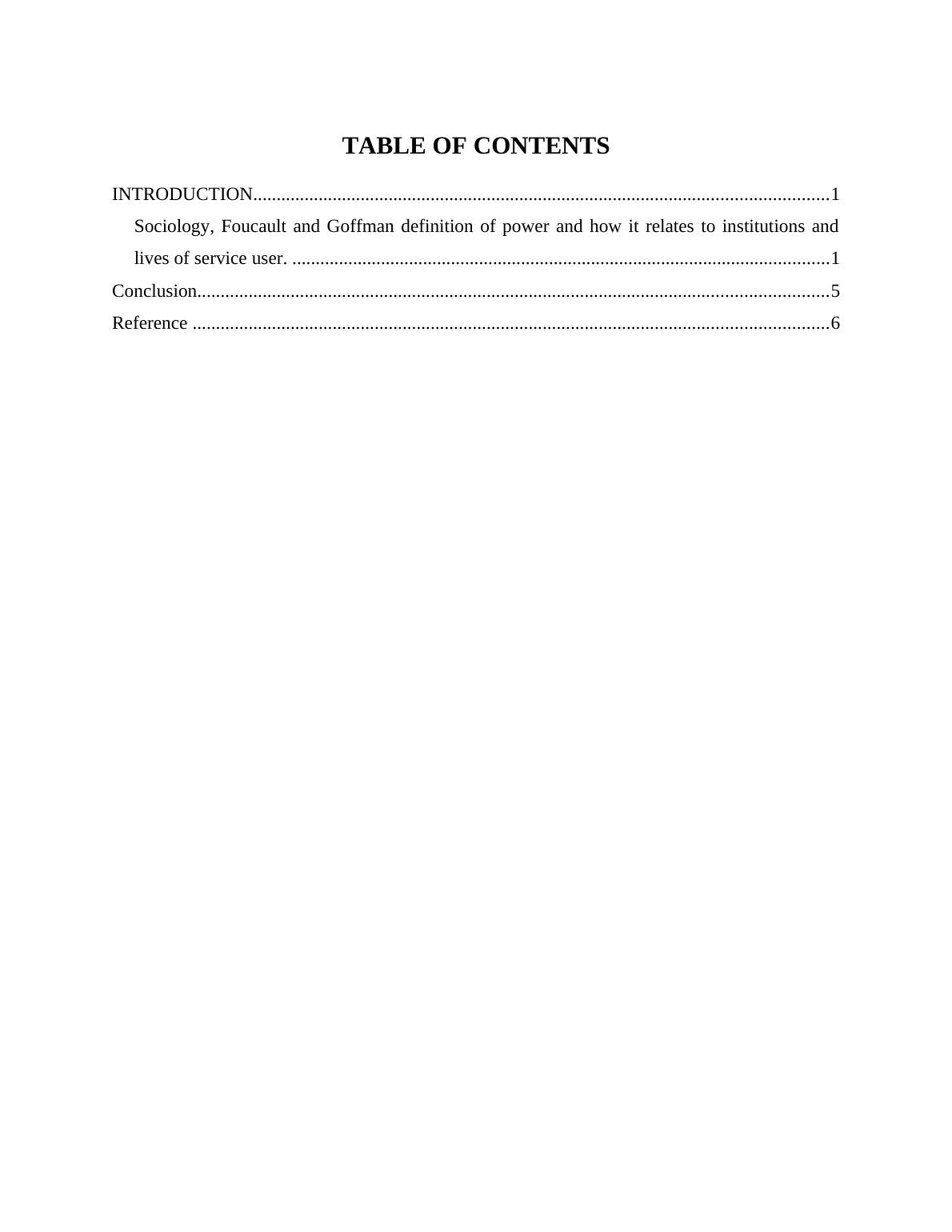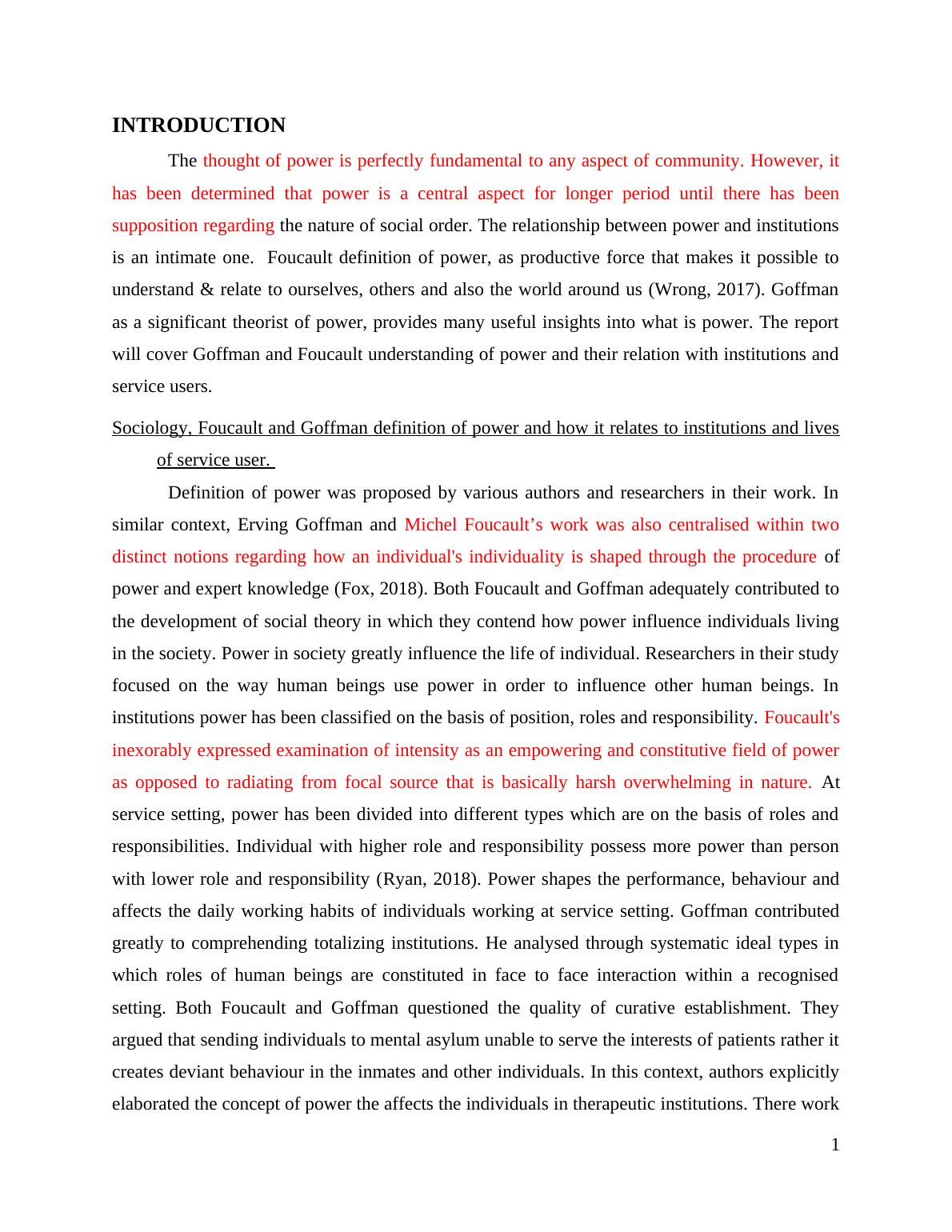Power and Society
Added on 2020-12-09
9 Pages2736 Words338 Views
ASSIGNMENT

TABLE OF CONTENTS
INTRODUCTION...........................................................................................................................1
Sociology, Foucault and Goffman definition of power and how it relates to institutions and
lives of service user. ...................................................................................................................1
Conclusion.......................................................................................................................................5
Reference ........................................................................................................................................6
INTRODUCTION...........................................................................................................................1
Sociology, Foucault and Goffman definition of power and how it relates to institutions and
lives of service user. ...................................................................................................................1
Conclusion.......................................................................................................................................5
Reference ........................................................................................................................................6

INTRODUCTION
The thought of power is perfectly fundamental to any aspect of community. However, it
has been determined that power is a central aspect for longer period until there has been
supposition regarding the nature of social order. The relationship between power and institutions
is an intimate one. Foucault definition of power, as productive force that makes it possible to
understand & relate to ourselves, others and also the world around us (Wrong, 2017). Goffman
as a significant theorist of power, provides many useful insights into what is power. The report
will cover Goffman and Foucault understanding of power and their relation with institutions and
service users.
Sociology, Foucault and Goffman definition of power and how it relates to institutions and lives
of service user.
Definition of power was proposed by various authors and researchers in their work. In
similar context, Erving Goffman and Michel Foucault’s work was also centralised within two
distinct notions regarding how an individual's individuality is shaped through the procedure of
power and expert knowledge (Fox, 2018). Both Foucault and Goffman adequately contributed to
the development of social theory in which they contend how power influence individuals living
in the society. Power in society greatly influence the life of individual. Researchers in their study
focused on the way human beings use power in order to influence other human beings. In
institutions power has been classified on the basis of position, roles and responsibility. Foucault's
inexorably expressed examination of intensity as an empowering and constitutive field of power
as opposed to radiating from focal source that is basically harsh overwhelming in nature. At
service setting, power has been divided into different types which are on the basis of roles and
responsibilities. Individual with higher role and responsibility possess more power than person
with lower role and responsibility (Ryan, 2018). Power shapes the performance, behaviour and
affects the daily working habits of individuals working at service setting. Goffman contributed
greatly to comprehending totalizing institutions. He analysed through systematic ideal types in
which roles of human beings are constituted in face to face interaction within a recognised
setting. Both Foucault and Goffman questioned the quality of curative establishment. They
argued that sending individuals to mental asylum unable to serve the interests of patients rather it
creates deviant behaviour in the inmates and other individuals. In this context, authors explicitly
elaborated the concept of power the affects the individuals in therapeutic institutions. There work
1
The thought of power is perfectly fundamental to any aspect of community. However, it
has been determined that power is a central aspect for longer period until there has been
supposition regarding the nature of social order. The relationship between power and institutions
is an intimate one. Foucault definition of power, as productive force that makes it possible to
understand & relate to ourselves, others and also the world around us (Wrong, 2017). Goffman
as a significant theorist of power, provides many useful insights into what is power. The report
will cover Goffman and Foucault understanding of power and their relation with institutions and
service users.
Sociology, Foucault and Goffman definition of power and how it relates to institutions and lives
of service user.
Definition of power was proposed by various authors and researchers in their work. In
similar context, Erving Goffman and Michel Foucault’s work was also centralised within two
distinct notions regarding how an individual's individuality is shaped through the procedure of
power and expert knowledge (Fox, 2018). Both Foucault and Goffman adequately contributed to
the development of social theory in which they contend how power influence individuals living
in the society. Power in society greatly influence the life of individual. Researchers in their study
focused on the way human beings use power in order to influence other human beings. In
institutions power has been classified on the basis of position, roles and responsibility. Foucault's
inexorably expressed examination of intensity as an empowering and constitutive field of power
as opposed to radiating from focal source that is basically harsh overwhelming in nature. At
service setting, power has been divided into different types which are on the basis of roles and
responsibilities. Individual with higher role and responsibility possess more power than person
with lower role and responsibility (Ryan, 2018). Power shapes the performance, behaviour and
affects the daily working habits of individuals working at service setting. Goffman contributed
greatly to comprehending totalizing institutions. He analysed through systematic ideal types in
which roles of human beings are constituted in face to face interaction within a recognised
setting. Both Foucault and Goffman questioned the quality of curative establishment. They
argued that sending individuals to mental asylum unable to serve the interests of patients rather it
creates deviant behaviour in the inmates and other individuals. In this context, authors explicitly
elaborated the concept of power the affects the individuals in therapeutic institutions. There work
1

End of preview
Want to access all the pages? Upload your documents or become a member.
Related Documents
Sociology in Applied Social Studieslg...
|7
|1845
|93
Michel Foucault’s concept of biopower, its operation and usefulnesslg...
|5
|1375
|380
The Social Dynamics of Fast Food: A Study of KFClg...
|11
|3387
|190
Journal of Psychiatric And Mental Health Nursinglg...
|9
|2562
|31
Assignment Hierarchy of Power in Australia’s Healthcare Systemlg...
|9
|2987
|44
Sociology Assignment Solution - (Doc)lg...
|5
|2991
|447
